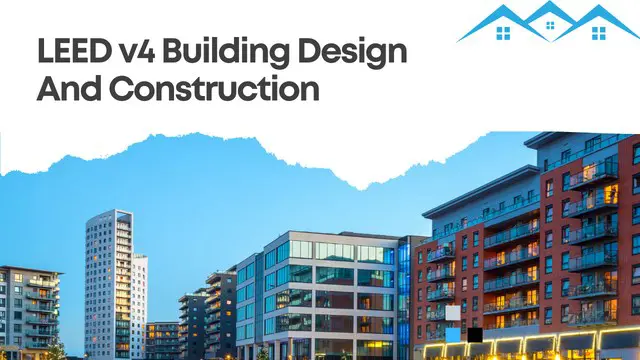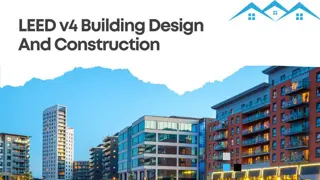
LEED v4: Building Design and Construction Diploma
CPD Certified| Free PDF Certificate | Lifetime Access | Learner Support | No Hidden Fees | 100% Success Rate
EDURISE
Summary
- Certificate of completion - Free
- Reed courses certificate of completion - Free
- Tutor is available to students
Add to basket or enquire
Overview
Are you ready to make a positive impact on the environment through sustainable building design and construction? Discover the world of LEED v4 with our comprehensive training course.
Why Choose LEED v4: Building Design and Construction Training?
In today's world, sustainability isn't just a buzzword; it's a critical aspect of our future. The construction industry plays a significant role in reducing environmental impact and enhancing energy efficiency. As a result, professionals well-versed in Leadership in Energy and Environmental Design (LEED) standards are in high demand across the globe.
Our LEED v4: Building Design and Construction Training course is designed for individuals and businesses committed to sustainable building practices. Whether you're an architect, engineer, builder, or project manager, this course will equip you with the knowledge and insights needed to navigate the LEED certification process successfully.
Course Highlights:
Understanding LEED v4: Get an in-depth understanding of the LEED rating system, its principles, and how it relates to green building practices.
LEED Credits and Categories: Dive into the specific credits and categories within LEED v4, exploring strategies for achieving certification.
Energy Efficiency: Learn how to optimize energy performance in buildings, reduce carbon footprints, and incorporate renewable energy sources.
Sustainable Materials: Explore sustainable material selection, life cycle assessment, and the importance of responsible sourcing.
Indoor Environmental Quality: Discover strategies to enhance indoor air quality, lighting, and thermal comfort for building occupants.
Water Efficiency: Explore water-saving technologies and techniques, including efficient fixtures and water reuse systems.
Case Studies: Analyze real-world LEED-certified building projects to gain practical insights and inspiration.
Who Should Enroll:
- Architects and Designers
- Engineers and Project Managers
- Building Contractors
- Sustainability and Environmental Professionals
- Construction Industry Stakeholders
Why LEED v4 Matters:
Sustainable building practices are more than a trend; they are a necessity. LEED v4 provides a roadmap for creating buildings that are energy-efficient, environmentally responsible, and healthier for occupants. With the growing emphasis on sustainability, LEED-certified professionals are highly sought after in the job market, and businesses that embrace these principles gain a competitive edge.
Join our LEED v4: Building Design and Construction Training course to stay ahead of the curve, drive sustainable innovation, and contribute to a greener, more sustainable future.
Enroll today and be a part of the sustainable building revolution!
Free Gift
- Course Completion PDF Certificate
- Tutor Support
Curriculum
Course media
Description
Module 1: Introduction to Green Design and Sustainability
- Learning Outcome 1: Understand the fundamental concepts of green design and sustainability in the context of the construction industry.
- Module Description: This module introduces the core principles of green design and sustainability, exploring the importance of environmentally responsible building practices.
Module 2: Components of Sustainable Design and Construction
- Learning Outcome 2: Identify and describe the key components that contribute to sustainable design and construction.
- Module Description: In this module, students will delve into the various elements that make up sustainable building practices, including materials, energy efficiency, and water conservation.
Module 3: Green Design and the Construction Process
- Learning Outcome 3: Explore the integration of green design principles into the construction process and project management.
- Module Description: This module focuses on how green design principles are implemented throughout the construction lifecycle, from planning to completion.
Module 4: Green Project Cost Monitoring and Closeout
- Learning Outcome 4: Gain insights into cost monitoring and closeout procedures specific to green construction projects.
- Module Description: Participants will learn to effectively monitor project costs and ensure that green building goals are met during project closeout.
Module 5: Green Building Materials and Products
- Learning Outcome 5: Analyze and select sustainable building materials and products that align with green design objectives.
- Module Description: This module explores the wide range of eco-friendly building materials and products available, emphasizing their impact on sustainable construction.
Module 6: Indoor Environmental Quality
- Learning Outcome 6: Evaluate strategies for enhancing indoor environmental quality in green building design.
- Module Description: Participants will examine techniques and technologies that contribute to improved indoor air quality, lighting, and occupant comfort.
Module 7: Water Efficiency and Sanitary Waste
- Learning Outcome 7: Implement water-efficient solutions and sustainable sanitary waste management practices in construction projects.
- Module Description: This module focuses on water conservation strategies, including the use of efficient fixtures and responsible waste management.
Module 8: Impact of Energy and Atmosphere
- Learning Outcome 8: Assess the impact of energy and atmosphere on green building design and sustainability.
- Module Description: Participants will explore energy-efficient building practices, renewable energy sources, and their role in reducing the environmental footprint of construction projects.
Module 9: Green Design and Building Economics
- Learning Outcome 9: Understand the economic implications and benefits of green design and sustainability in the construction industry.
- Module Description: This module discusses the economic aspects of green design, including cost savings, long-term sustainability, and return on investment.
Module 10: Project Cost Analysis
- Learning Outcome 10: Apply cost analysis techniques specific to green construction projects.
- Module Description: Participants will learn how to conduct cost analysis for green building projects, considering both upfront and long-term costs.
This course equips individuals with the knowledge and skills needed to contribute to sustainable building practices and make informed decisions in the construction industry.
Certificate of Completion
After completing the LEED v4: Building Design and Construction diploma course, you will be able to obtain your free PDF certificate of course completion.
Who is this course for?
Ideal Audience:
Construction Professionals: Architects, engineers, project managers, and contractors seeking to expand their knowledge of green design and sustainable construction practices.
Environmental Enthusiasts: Individuals passionate about environmental sustainability and looking to contribute to eco-friendly building projects.
Building Owners and Developers: Property owners and developers interested in implementing sustainable design principles to enhance the value and efficiency of their projects.
Students and Educators: Students pursuing degrees or courses in architecture, engineering, or construction management, as well as educators teaching related subjects.
Government and Regulatory Officials: Professionals working in government agencies responsible for building codes, standards, and sustainability regulations.
Environmental Consultants: Those involved in providing expert advice on green building practices to clients in the construction industry.
Facility Managers: Professionals responsible for the long-term operation and maintenance of buildings interested in sustainable and cost-effective practices.
Sustainability Advocates: Individuals dedicated to promoting sustainability and eco-friendly practices within the construction sector.
This course is designed to benefit a wide range of professionals and enthusiasts interested in understanding and implementing sustainable design and construction principles. It provides valuable insights into green building practices, which are increasingly relevant in today's environmentally conscious world.
Requirements
The LEED v4: Building Design and Construction course has no formal entry requirements.
Career path
- LEED Trainee: Entry-level position, often during training with salary varying.
- Certified LEED Professional: After completing training and gaining experience, salaries can range from £30,000 - £50,000 per year in the UK.
- Senior LEED Consultant or Sustainability Manager: Experienced professionals may earn £50,000 - £80,000 or more annually, depending on the complexity.
Questions and answers
Currently there are no Q&As for this course. Be the first to ask a question.
Certificates
Certificate of completion
Digital certificate - Included
Reed courses certificate of completion
Digital certificate - Included
Will be downloadable when all lectures have been completed
Reviews
Currently there are no reviews for this course. Be the first to leave a review.
Legal information
This course is advertised on reed.co.uk by the Course Provider, whose terms and conditions apply. Purchases are made directly from the Course Provider, and as such, content and materials are supplied by the Course Provider directly. Reed is acting as agent and not reseller in relation to this course. Reed's only responsibility is to facilitate your payment for the course. It is your responsibility to review and agree to the Course Provider's terms and conditions and satisfy yourself as to the suitability of the course you intend to purchase. Reed will not have any responsibility for the content of the course and/or associated materials.


